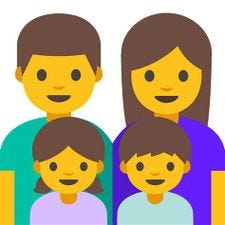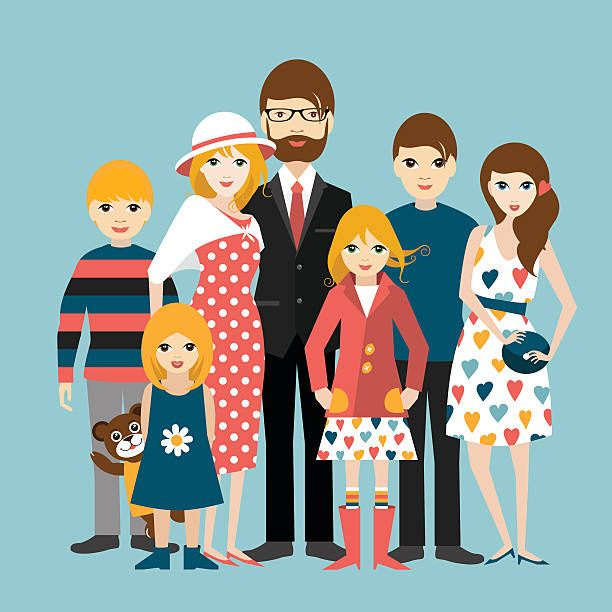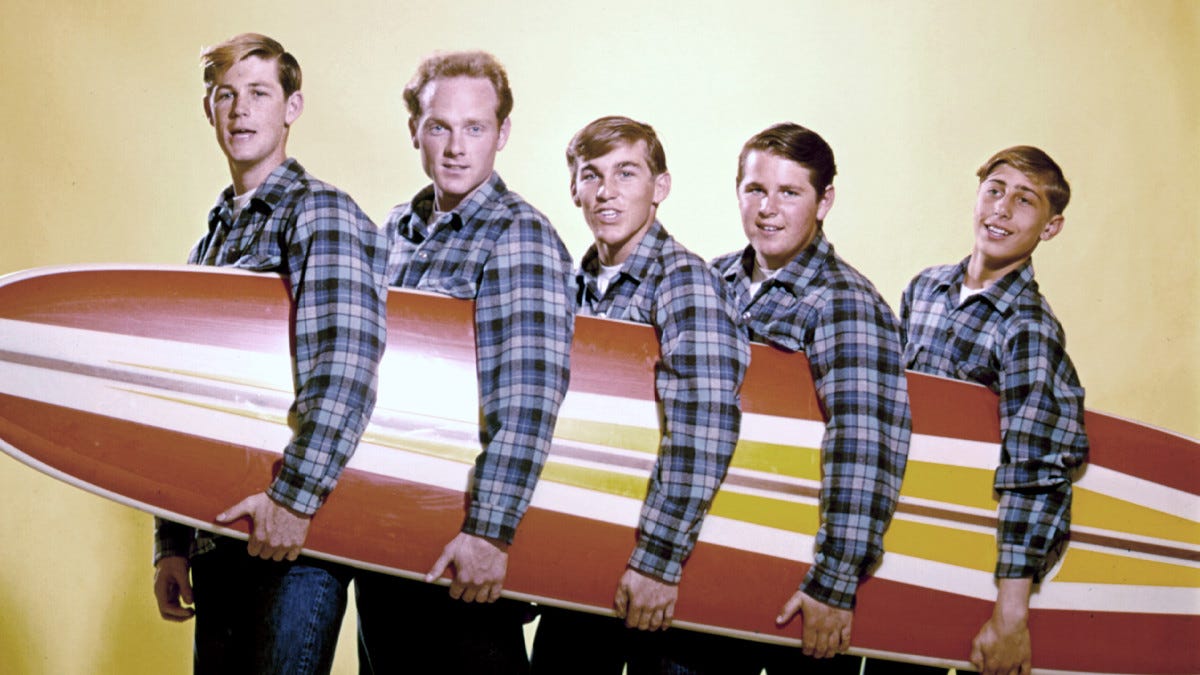It begins, as always, with proper understanding.
Do you remember those old ads, this is what a family looks like? Well this is what a family looks like.
A childish drawing of a grown-up insight.
We start with a couple. They have a background and an origin, indicated by the ellipsis to their left. They form and pass on a heritage and an identity. They have children. All of those children have a destiny, indicated by ellipses also. We focus on the rightmost. He vitally and dynamically grows into a man. He meets and marries a woman who brings some of her own heritage to add to the family. They have children. The family process goes on and on. It has not inherent end. Families are like elves. They die, but there is no natural life span at which they must die.
Reality is not a tapestry. Reality is a series of braids, with threads linking the braids to each other.
The family you see in your mind is basically an emoji: dad icon mom icon girl icon boy icon. Not all families are like that but that is a standard baseline and that is okay.
That picture in your mind just an image or a snapshot of a family. A real family exists in time. Its organs are generations.
Oh, you mean an extended family? No, that’s still just a part, a snapshot, just a snapshot with a wider lens. An extended family is no more the definition of family than an extended abdomen defines a human being.
The real family has some element of blood ties, kinship. It also has a continued identity, fictive kinship.
When you set out to stead a family it behooves you to know what a family is made of and how a family grows.
***
We will not guide you in creating your blood kinship. Figure that one out your self. Find a comely young person of the opposite sex and play doctor.
The other part, building that family identity strong enough to last through time, there we have some wisdom for you. (Having the ambition is half the battle by the way, congratulations).
If you have not already read our write up on berry pickin’ and family vibes go take a look. Some of the key principles are there.
But today let's talk about having a large family. Lots of kids. Popping ‘em out. Blood kinship gonzo style.
Lets talk about how quantity has a quality all its own.
What is the wisdom of that? Let’s reason.
First reason—Being a big family sets your family apart from most. That gives you that little bit of separate identity right there. Almost everyone who comes from a big family finds it to be a positive experience. So something that is different about your family and also rewarding about your family at the same time is laying good ground for your kids to start thinking there is something there they need to pass on.
Second reason—to be crudely practical about it, the family that grows through time must have kids who grow up to have kids. That’s partly just a numbers game. More kids=more chances for one of your kids to catch the vibe. There is more to it than that though. What you do as a parent establishes what is high status in your family. Your children take their cues from you at a fundamental level. If you have lots of kids and relish having kids they will relish having kids too. You can’t convey that you relish having kids if you don’t have them. True, you having more than average does not mandate that your kids will do same. It's not automatic. It is not guaranteed. You will need to hang a lantern on what you're doing and explain to the kids many different times and in many different ways why having more brothers and sisters and more children are so great. But the fundamental step is having more children yourself.
There are some plants that grow from the roots and some plants that grow from the tip. Your family grows from the tip. If the fresh growth stops growing, your family will have a family bush instead of a family tree.
The first reason is contingent on modern times. In an era where most ambitious and capable people were big family people – using the modern meaning of big which could mean as few as four children and in some of the districts most hostile to human life, as little as three – your big family would not set you apart. To stand out you would have to up the ante to have even more kids in a kid having arms race. Being a modern-day Genghis Khan, a one man clan, having your own tribe bred by you in your lifetime . . . well, actually, that is all for the good. But you are not ready for that conversation
The second reason, creating a pro-demography vibe, holds even outside the modern environment but it is also fairly cold-blooded reason.
Let's turn to a third reason that we have not addressed yet. Here is where we get into how identities happen.
You can consciously shape identity. A lot of what we call personal growth is just you shaping your own identity. In the same process you can shape your family identity. But you can only shape what is already coming into existence.
Think of a bonsai plant. It has its shape because of the powerful, painstaking, and relentless choices of the shaper. On the other hand a tree can grow wildly and exuberantly, full of natural beauty, without a shaper at all. And even the bonsai tree is not all the work of the bonsai artist. The tree has its own internal principle of growth that the master worked with but did not create. Family identity or what elsewhere we have called the family vibe can be shaped by you but it needs its own natural principle of growth.
Time for a side track into vibes and identity. (Vibe social science has been neglected too long. Just one of the many ways in which the steaders are putting things right.)
Vibes were invented by the Beach Boys. Before then the world was in black and white and people’s inner life was monochromatic. Swearsies.
Plaid flannel blue jean surfer manlets-in-back vibe
A vibe is a lot of things but what it mainly is is the sense that emerges from a human’s interaction with their environment or with another human. It’s the fleeting impression of the moment based on the union of who you are/who you are being and where you are or who you are with. Vibes are cherry blossoms. Vibes are haiku.
Because people respond to vibes, there is feedback. Who you are/who you are being creates the vibe but then the vibe alters who you are/who you are being.
Identity is the synthesis of who you already were plus the vibes you experience. In shorthand, we might say that identity is just a persisting or reoccurrent vibe.
A vibe can be fleeting but any underlying vibe that remains becomes identity. Like a motif or theme in music.
Identities can be shaped, but what actually creates them—their principle of natural growth—is interaction. Identity is an emergent property of to a lesser extent interaction with the environment and to a greater extent of human interaction with other human. Identity is an emergent property of human relationships. Identity is where all the vibes coalesce.
Anytime one person interacts with another person there is a vibe. There just is. There has to be. They interact again, there is a tiny growth of some aspect of identity. The more frequent, the more in depth, the longer the more this growth becomes identity.
But where the identity really shoots up like a weed is when you have repeated persistent interactions between a group of people. Bob and Clarence and Frederick are a trio and Bob spends time with Frederick and Frederick spends time with Clarence and Clarence spends time with Bob. There is a multiplicative effect.
If you think of human relationships as a network, Bob and Clarence and Frederick are not just ordinary nodes. They are a network cluster. That is identity forming. Highly clustered groups with repeated interactions over time strongly form identity.
Large families are extremely very highly clustered group relationships with a strong multiplier from being so intimate and a strong multiplier for having more people.
In a large family, you have persistent repeated deep intimate interactions among a number of repeat players, i.e., the family members. Identity emerges naturally like dew on the morning grass. You do not will into existence, it just comes. And it will be deeper and richer and sweeter than anything you imagined or planned on your own.
You still shape that vibe. You make conscious decisions that mix in to the brew. But that beautiful tightknit thing is no more your doing than the children themselves are. You have those inside jokes. The time spent listening to each other, comforting each other, the time Sally slipped spontaneously while washing the dishes, the stories that are passed back and forth and repeated and reminded. You have a dense highly interactive network cluster and out of that something beautiful comes. Layers and layers of meaning and memory and experience.
Many kids, having a big family, fecundity, is an essential tool for the modern-day family founder. And because it is where happiness lies, it is the steader way.












